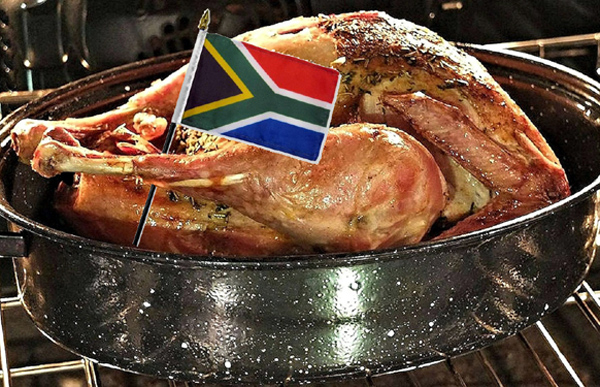 South African playwright, Chris Pretorius, just published an essay of apprehension about America’s upcoming Thanksgiving..
South African playwright, Chris Pretorius, just published an essay of apprehension about America’s upcoming Thanksgiving..
Below are some of my favorite parts:
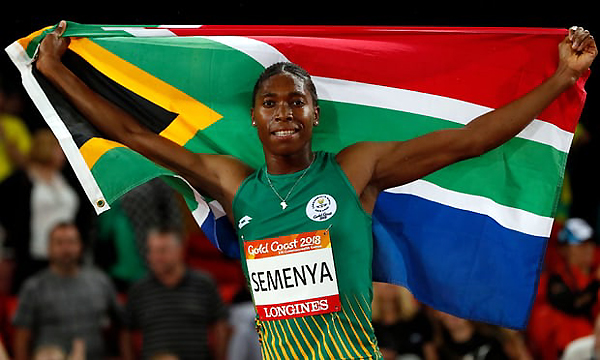 Man or Woman? South Africa’s Caster Semenya was the world’s best, all-time middle-distance woman runner… until last week when global sports authorities announced they would reverse her many wins and ban her from future competition because of her hyperandrogenism.
Man or Woman? South Africa’s Caster Semenya was the world’s best, all-time middle-distance woman runner… until last week when global sports authorities announced they would reverse her many wins and ban her from future competition because of her hyperandrogenism.
The proposed action drew immediate and strong protests from such running powerhouses as Canada much less South Africa, opening the ultimate can of sports worms: what constitutes gender?
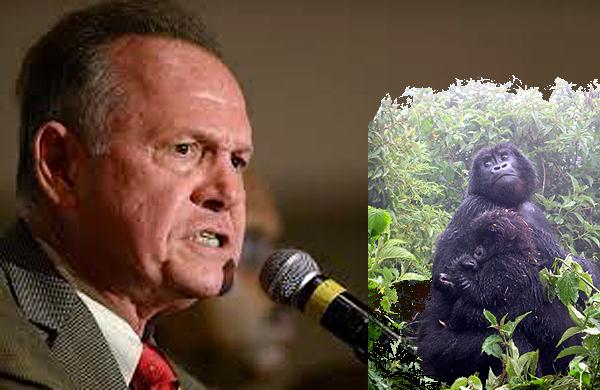 Mountain gorillas love wild celery. It’s their favorite food. They learn early on that it grows best at forest edges. So they often forage forest edges hoping to find patches of wild celery.
Mountain gorillas love wild celery. It’s their favorite food. They learn early on that it grows best at forest edges. So they often forage forest edges hoping to find patches of wild celery.
But men go much further. Men harvest and cultivate seeds. They know that if they pollinate the best stalks they can ultimately harvest a much better form of celery. Gorillas can’t do this. They can’t think that far.
The greatest difference between men and Africa’s great apes is this complexity of syllogistic thinking, reasoning a series of logical truths to form a conclusion. The Republican National Committee and the supporters of Roy Moore are not syllogistically thinking unless they mean to lie.
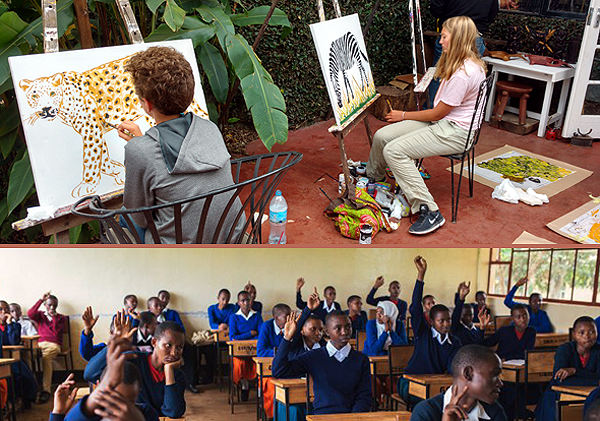 People come on safari to see lions and elephants, but they return for another trip and refer their friends often because of the surprisingly moving non-game viewing experiences.
People come on safari to see lions and elephants, but they return for another trip and refer their friends often because of the surprisingly moving non-game viewing experiences.
Just as there’s more to America than Disneyland and Vegas, there’s a whole lot more to the places where the great animals still roam the wild.
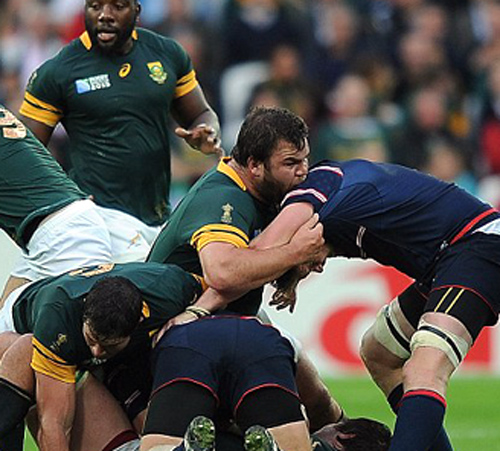 What has fewer points than a South African samoosa?
What has fewer points than a South African samoosa?
For the record, a South African samoosa has three points.
Answer: The U.S. Rugby team in its match with South Africa. Lost 64-0.
Yesterday’s qualifying match for the Rugby World Cup followed America’s loss to Samoa. Not getting any points in a World Cup qualifying match is something normally left to the Maldives and East Timor. Should America even be playing rugby?
Rugby is South Africa’s soul game. They have always been so much better than most of the rest of the world.
I remember a number of years ago when Kathleen and I were taking our children on a “Garden Route” trip east of Cape Town. I didn’t know that weekend the South Africans were playing the New Zealanders in rugby.
Instead, I presumed the end of the world was beginning. We were the only car on several different highways. There was no one at a gas station to pay for fuel. When with trepidation we arrived our hotel in Outdshoorn, the doors were open to reception, but there was no one to be seen.
Everyone was plastered in some room to a TV.
When commenting on the pitiful U.S. team’s performance, South Africans were polite about the trouncing they gave the U.S.
“Finance cannot be attracted away from the big American sports,” one of South Africa’s leading sports commentators, Mike Greenaway, explains to his puzzled South African readership.
Isn’t the U.S. first in everything? Especially when brute force is a critical component? Greenaway points out that the U.S. Eagles Rugby team isn’t really a team at all, composed of part-timers, most of whom are foreigners living in the United States:
“Samoans, Tongans, Englishmen, Irishmen and a South African by the name of Kruger. Niku Kruger went to Pretoria Boys’ High and is the son of Afrikaans actor Ben Kruger, who is still performing in South Africa.”
So really, who cares? Would you believe that the Wall Street Journal cares?
“… it takes about four seconds of watching rugby to grow tantalized with the possibilities, to realize this game is right in the U.S. wheelhouse. It requires speed and strength and creativity and a love of watching massive bodies bang into each other at high speeds.”
Massive bodies banging into each other at high speeds is actually how I view rugby. True, there are many serious injuries in American football, but I think American football is a much better expression of team strength and physical prowess.
I’m not alone.
The Brain Injury Law Center reports that the incidence of a head injury is four times greater in rugby than in American football.
The NFL played a game in London Sunday and about three-quarters of the stadium was filled. This is the fourth year since the NFL began trying to develop interest in the sport in Europe, and … well, it’s not going too well.
Rugby still reigns supreme as the attack dog sport in the UK as it is in South Africa. Unlike South Africa which would rather prostrate itself before the World Court for past apartheid crimes than submit itself to scrutiny of the health of rugby playing, the UK is beginning to recognize the beastliness of rugby:
“In rugby it is spinal injuries from scrums that are the most dangerous (110 rugby players in Britain have been paralysed by playing the game),” London’s Guardian newspaper reports.
I don’t like boxing, either. I rather think Nascar hedonistic sado-masochism. Actually, a lot of sports that tear children away from childhood to produce the world’s best tennis players and ice skater twirlers … well, that seems rather bad, too.
So that leaves football as a moral sport of supreme power choreographed with some of the most beautiful and precise moves the human body can achieve.
So come on you beasty Boks, I’d like to see you take on my Packers!
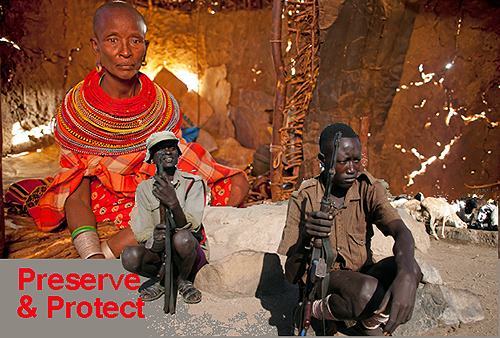 Canada has just embraced a preservation of native values, whereas Kenya seems forced to aggressively ban them.
Canada has just embraced a preservation of native values, whereas Kenya seems forced to aggressively ban them.
A remarkable investigation published today in Nairobi shows the enormous difficulty that traditional societies have preserving their life ways in the modern world.
Kenyan Anthony Kuria concludes his excellent investigation:
“Children are meant to enjoy the purity of an untainted childhood, have the opportunity to go to school as well as the privilege to freely enjoy and experience the simple things in their lives. Finding alternatives to [“Beading”] is, therefore, an imperative.”
“Beading” by Samburu people in the north of Kenya is a practice closely associated to FGM and forced marriage. Kuria is modern. The people he was interviewing were not.
Samburu land is an area I know well, and I’ll be returning to it in February with another group of loyal travelers. It’s one of the most beautiful areas in the world, very similar to America’s great southwest. And like America’s great southwest, much of it is not particularly hospitable to humans.
Several generations ago the traditional people who lived here – the Samburu, Turkana, Rendile and Boran among others – were strictly shepheds. This is a near universal life way of people all the way from lower Egypt down to the equator who survive in very arid conditions.
The cattle munch what little greenery exists, and there’s not much. So the cattle are forever wizened and probably sick, but they are the critical ingredient for survival of these near-desert people.
The people don’t eat the cattle, they concoct a yoghurt made from the blood and milk of the herd that is probably among the most nutritious health foods on earth! (I have tried it only once and do not expect to duplicate the experience.)
The goats are kept to support the cattle: when a baby cow is born, the mother’s milk is the most nutritious, so it is kept for the people. The calve is taken away from the mother and raised on the less nutritious goat’s milk.
This simple survival method has worked for millennia for millions and millions of people. But in my life time radical changes have beset Africa. The arid lands are now rich with oil and other minerals. Even leapfrogging fossil fuels, many remote parts of the near deserts of Africa now support massive solar and wind farms.
This rapid change dislocates traditional peoples and their values. “Beading” was part of a lengthy process of ritual in the traditional Samburu tribe, linked to FGM and forced marriage, that probably was as critical to the survival of the Samburu as were cattle.
But it’s not just that it has changed, it must change.
In today’s modern Africa those who linger in the past are tread upon, ignored or miserably manipulated. They become the pawns in terrible conflicts, as today we see in Samburu where ancient enmities between various tribes are exaggerated by modern weaponry and instant communications.
Modern police often find themselves in the crossfires.
FGM and associated practices like “Beading” have been outlawed in many African countries for a number of years, but enforcing these laws has – until now – been intentionally lax:
“Jail sentences only last a few days or weeks after which they are released on condition that they will not violate the rights of the girls again,” Kuria reports.
The main reason enforcing “modernity” is so hard in places like Kenya is because in the modern world, not the traditional world, tribal practices are deemed wrong and immoral. That’s a near unbridgeable divide.
Were development to occur more rapidly: were more good schools built more quickly, more good roads laid, more electricity provided, then the preeminence of “modern” becomes inviolable. But that isn’t the case yet in much of Samburu.
Not until deep oil wells or huge solar farms are cut into the landscape does real development come along. That brings its own controversies among modern Kenyans, just as among modern Americans.
“Beading,” FGM and forced marriage ought not be condoned. But to ban them without providing modern alternatives to the people who still embrace them is as equally wrong as to allow them in our more enlightened world.
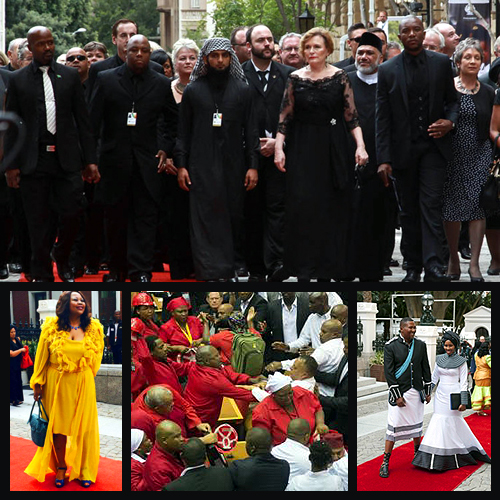 South Africa’s State of the Union last night was not “unprecedented chaos,” just theater at its best. Isn’t that what government is all about?
South Africa’s State of the Union last night was not “unprecedented chaos,” just theater at its best. Isn’t that what government is all about?
One longs for days past when information didn’t fire so quickly all over the place, when natural barriers – like time and party lines – filtered the nonsensical from what was important.
We all want thrills. There’s no thrill in a chief executive reciting all his accomplishments. Rather, we want to see a Congressman shouting at the President, or a void left by a Supreme Court Judge.
Last night in South Africa their State of the Union erupted into ultimate theater.
It was abjectly comical.
The main drama was when members of the country’s most revolutionary party, the Economic Freedom Fighter Party (EFF), interrupted proceedings demanding President Jacob Zuma repay the country for the millions used to refurbish one of his homes.
It’s a legitimate, major scandal.
Zuma’s own government investigators have determined wrongdoing, although no consequences have followed other than Zuma vaguely promising that he will repay. (Zuma’s life as president has been one scandal after another.)
The Speaker of Parliament then instructed the EFF – properly dressed in reddish orange jumpsuits – to shut up. The EFF refused, the decibels were raised, and then the Speaker ordered Parliamentary security to forcibly remove the EFF.
Later EFF leaders claimed seven of its members were injured by security officials.
A much more respectable party, the Democratic Alliance (DA), came to the party all dressed in glamorous black as a symbol of the death of democracy, then walked out en masse after the eviction of the EFF.
Parliament was left with the ANC and a handful of stringer-on parties, like the communists, and President Zuma dutifully continued his very boring address.
Media has pretty universally now termed last night as “chaos.” It wasn’t. It was theater.
Clearly the EFF had planned on the disruption. Clearly the DA had planned on making a point of the expected disruption. And clearly, the ANC had plans for clearing them both out.
Important security officials in the government were walking in and out of Parliament as if on cue before, during and after the eviction. Journalists’ phone and video signals were jammed inside the hallowed halls just before eviction. The white shirted bouncers strong enough to shove the EFF out of the hall were not regular Parliament employees.
This was all planned, on all sides, and it was quite a show. In fact South Africa’s State of the Union is a media spectacular not dissimilar to our Oscar’s.
Celebrities arrive wearing outlandish and lavish fashions, dip before the cameras before walking on the red carpet into the hallowed chambers. There was the grandson of Nelson Mandela in a newly created Parisian tailored suit inspired by his grandfather’s tribal garments.
There was the country’s head of the police walking awkwardly to keep in balance her newly polished chest of medals.
And there were the various parties, uniformed in chosen colors in perfectly starched arrays of dissemblance.
“It was a landmark setback for Zuma,“ one of South Africa’s major newspapers claims.
I don’t think so.
It’s just what we always expect from South Africa: just a show.
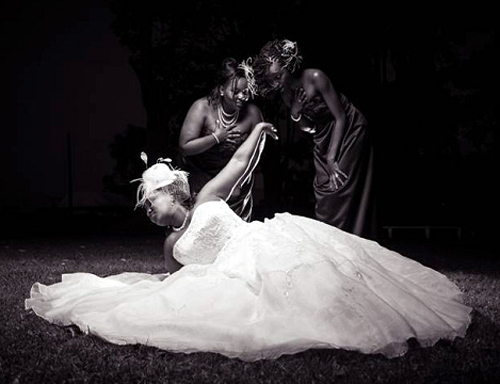 GDP isn’t the only thing growing in Africa. Young Africans’ popculture is quickly overtaking America’s and Europe’s.
GDP isn’t the only thing growing in Africa. Young Africans’ popculture is quickly overtaking America’s and Europe’s.
One of Nairobi’s most talented artists is Osborne Macharia. His K63 Studio is a sought after commercial enterprise by everything from chic weddings to fast cars.
I thought I’d leave you this week with some of his digitally enhanced photos, which evoke enormous reaction from me.
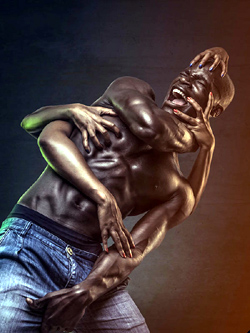
– Osborne Macharia
The modern young progressive African guy is having trouble. His machoism is continually suppressed … by his peers, by his mentors and mostly, by himself.
Traditional African culture is as misogynistic as you can get. Polygamy doesn’t say it all, by a long shot. Whether a traditional family was rich or poor, the woman did all the work, and I’m not talking about house chores. She toiled the land, harvested the crops, sold the crops, distributed the crops … and raised the kids while submitting to the man’s every whim.
This generation of kids is several or more generations from that life style, but it’s still a much greater difference between their grandparents than ours, for example.
One of the residues of a progressive, educated man trying to fit into the modern world — or so it is widely believed — is that the man becomes too submissive and grows easily manipulated by every woman who gives him a glance!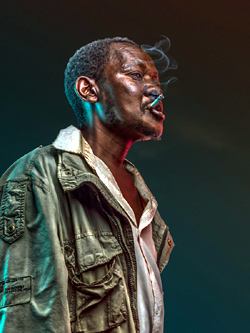
– Osborne Macharia
I see it as a fundamental problem of successful capitalism overlaid rapidly developing cultures that are so out-of-control dynamic like in Kenya.
We’re in a state of affairs right now in places like Kenya where the disenfranchised and displaced are so suppressed that the country as a whole is just shrugging its shoulders and ignoring the inevitable. The poor sot who works all day for a dime then goes home to an 3-room apartment shared by his extended family, that in turn shares a bathroom with four other apartments … well, you get the picture.
Eventually resignation turns into desperation: exhaustion becomes revolution.
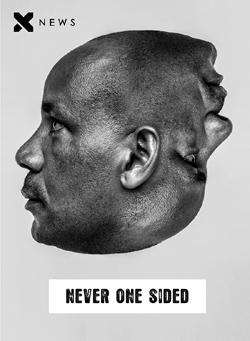
– Osborne Macharia
In America, today, we’re so inured to the ridiculous concept of objectivity that it no longer offends us that Anderson Cooper invites a “panel of experts” that includes a climate change denier … to be “fair and balanced.”
Well it happens too all the time in the Kenyan media, and Nairobi youth in particular see it as a caricature of substantive problem solving.
I can see in the bony neck and starved face of Osborne’s Gender Based Violence piece a continuation of the gender conundrums of the first piece above, Man-ipulation.
The woman in this picture is an amalgam of a peasant, a witch and a modern gal. Although the three reside in radically different places in Kenya’s rainbow culture, although their education differs widely, they are still equally suppressed and abused.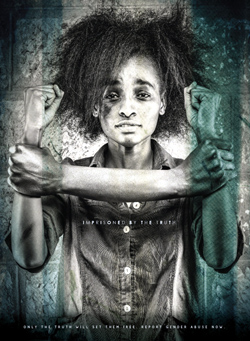
-Osborne Macharia
And like our own situation recently to the fore in the NFL, it’s deeply engrained and horribly facilitated by the so-called modern cultural kingpins.
This brilliant piece was commissioned by Oxfam, one of Europe’s largest aid organizations.
I would have liked Osborne to have moved even beyond Man-ipulation and Gender Based Violence and deal with the most egregious of all gender-based discrimination in Africa, that against the LGBT community.
Next door Uganda is ready to hang every gay, and very similar sentiments have been raised in Kenya’s own Parliament. There is a vibrant and courageous LGBT community in Nairobi. I’m sorry Osborne doesn’t see fit to represent them.
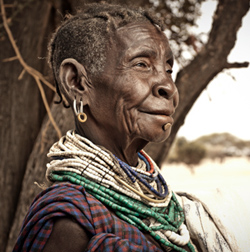
-Osborne Macharia
In these places the aboriginal peoples are mostly ignored, as they have been since colonial times. Their development is compromised by a constant struggle between modern resource extraction and traditional life-ways.
And you can guess who wins that battle.
I think that Osborne by depicting an old lady who has somehow found contentment if even amusement as she stares over her pillaged land has captured both the patience and quiet self-confidence of Africa’s forgotten aboriginals.
It’s a melancholy that’s so easily taken advantage of, but at the same time it’s a spirit that’s remarkably enduring.
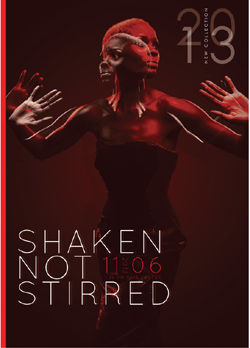
-Osborne Macharia
Nothing very deep about this beautiful piece created to promote one of Nairobi’s very popular and increasingly important fashion shows.
This one featured super models from Nigeria and China.
So that’s one Osborne Macharia. Young, fantastically talented and courageously outspoken!
Enjoy your weekend. I hope you’ll be thinking about Africa when you do!
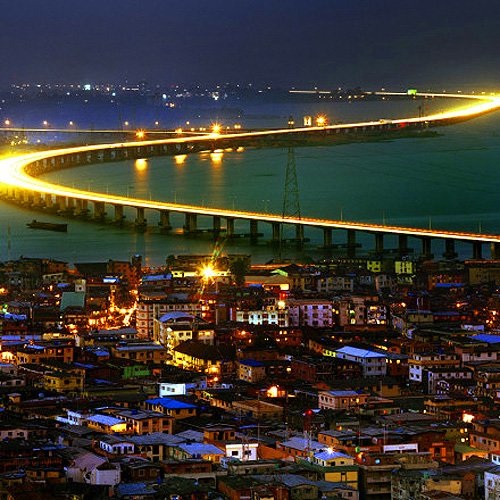 What’s going on in Nigeria is Art: The Art of Life in a mega-city after the village. The Art of Survival in the age of Snowden. It’s a mega-mess, beautiful and getting better. By most accounts there’s less of a chance you’ll get killed, now, but if you do it’s likely your coffin will be fusia colored.
What’s going on in Nigeria is Art: The Art of Life in a mega-city after the village. The Art of Survival in the age of Snowden. It’s a mega-mess, beautiful and getting better. By most accounts there’s less of a chance you’ll get killed, now, but if you do it’s likely your coffin will be fusia colored.
The Lagos Photo Festival opened last weekend and will run through the middle of the month in, yes gulp but then reconsider, Lagos.
Lagos is doing better. Let’s start with the worst: it’s 15 million large and growing (the actual gazetted city is 10 million; surrounding areas that are indistinguishable from this core, another 5 million). There are frequent power outages, although they’re brief. There’s still widespread crime at all levels, from pickpocketing to kidnappings, and the huge police presence is basically there to institutionalize it all.

But truly, the locals, both Nigerians and some of the near 40,000 paid expatriates, think in just the last two years things are definitely improving.
“Vibrant chaos,” is how one of dozens and dozens of expats blogging about “Life In Lagos” puts it.
And practically everyone points to the new governor, recently reelected with 81% of a totally fair and democratic vote, as the reason.
Babatunde Raji Fashola (San) has crushed much of the mafia, reformed much of the police and significantly improved delivery of public services in a short two years. How? By stopping so much of the corruption that siphoned off public funds.
Nigeria can easily be Africa’s richest country. Yes, even richer than South Africa, and that’s a simple calculation of the amount of oil it can still produce.
The Lagos Photo Festival seems to me to embody all that’s good and exciting about this very recent transition from crime and moral oppression into a legitimate society.
What I’ve seen digitally is definitely in the forefront of photo art. Much of it understandably builds on color, as a given characteristic of almost anywhere in Africa. Another central theme among the 50 artists being exhibited is order from chaos, somewhat embodied in the festival’s title, “From Village to MegaCity.”
 When Guernica magazine asked the LPF founder, Azu Nwagbogu, why he created a festival dedicated to photography, he replied, ”[That is] the fastest growing art tool on the continent, and it’s perhaps the easiest to gain access to.”
When Guernica magazine asked the LPF founder, Azu Nwagbogu, why he created a festival dedicated to photography, he replied, ”[That is] the fastest growing art tool on the continent, and it’s perhaps the easiest to gain access to.”
Nwagbogu is not any more a photographer than a musician. In fact, what he really is is a trained public health official who almost became a professional boxer. Rich enough to wander through Lagos’s new social scene easily, he’s able to command the network that can create something meaningful in a sea of 15 million.
It’s a sad fact, today, in Africa that capitalism is exploding so fast that the trajectory of the rich leads them quickly away from their roots. Many of the artists Nwagbogu has collected for this festival are unknown, precisely because they weren’t rich enough to emerge out of the hoards.
A great example is Afoso Sulayman, born in Makoko, one of Nigeria’s biggest slums. His work is definitely inferior to many of the others, but he’s only begun. He claims to have been photographing for less than a year.
That type of affirmative action in an art festival is something only Africa dare do. And it may ultimately lead not just to new amalgams but new definitions of what art in the modern world really is.
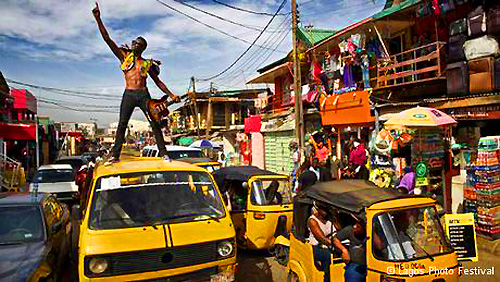
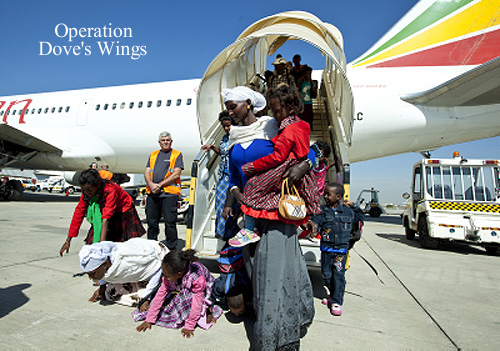 This month marked the last planned charter flight of presumed African Jews from Ethiopia to Israel, capping a generation’s long program that “repatriated” more than 40,000 Ethiopians.
This month marked the last planned charter flight of presumed African Jews from Ethiopia to Israel, capping a generation’s long program that “repatriated” more than 40,000 Ethiopians.
(Some reports put the number as high as 92,000.)
Referred to as “aliyah,” the collection and immigration of disparate Jews from around the world into Israel is public policy, but is mostly funded privately. Once in Israel the state apparatus provides various educational and financial assistance.
The stated policy of Israel to provide citizenship and security to any Jew anywhere in the world is referred to as the “Right of Return” and imbedded in the entire raison d’etre of Israel.
Many impoverished around the world, however, wishing to invoke the Right of Return are unable to do so on their own. And many who are simply among the throngs of Africa’s impoverished who long to immigrate to someplace with a better opportunity, try to invoke the Right of Return with little evidence they are Jewish.
Avi Bram writing in Think Africa Press this week called the end of Operation Dove’s Wing “A page … turned in the history of Jews in Ethiopia. But despite what Israel may think, the page doesn’t mark the end of the book, but merely a new, uncertain chapter.”
The Ethiopians returned to Israel in Operation Dove’s Wing had to demonstrate seven generations of Jewish lineage to be eligible for aliyah. Over the last ten years large numbers of Ethiopians migrated to the town of Gondar where various Jewish agencies were supporting temples and Hebrew education programs.
But in the end as many as 7,000 Ethiopians claiming to be Jewish were left behind. Now that Operation Dove’s Wing has ended, almost all of the Jewish agency support is ending, although other NGOs to some extent may replace them.
But the dynamic of Africans wanting to be considered one thing or another, so that they can be brought to a better world, and then examined by a stated government policy to credential lineage, verges on institutionalized ethnicity if not outright racism.
In the case of the Ethiopian Jews, the four major programs in 1984, 1985, 1991 and the last ending this month, were funded largely from American, South American and European Jewish communities.
I witnessed the 1984/85 “Operation Moses” which was the first program in Addis, and it differed considerably from what I watched happening this month.
Back then the tarmac of the Addis airport was filled with white tents, El-Al 747s, and many professional Israelis, especially doctors. Busloads of very traditional Ethiopians would come onto the airfield, be examined and were often so naked that they had to be clothed as well before boarding the aircraft.
That operation, by the way, differed in many respects from subsequent ones. Technically these Ethiopians were refugees being bussed in from Sudanese refugee camps through the country they had fled.
The toppling of Haile Selassie, the last emperor, led to a very turbulent period in Ethiopia known as the Red Terror. Large numbers of refugees were sent into mostly The Sudan. The Sudan wasn’t kind to them, being one of the most anti-Israeli countries in the world.
So there was some real humanity in Israel’s program to bring those refugees into greater safety. To be sure, the ruthless dictator of Ethiopia at the time, Mariam Mengistu, had no love for them, and it was also a deft diplomatic effort of Israel that organized the exodus from Addis.
But that being said, I remember thinking from conversations with several Americans who were with me at the time and who were associated with the operation, that quite a few non refugee Ethiopians were squeezing into the mix that was being transported to Tel Aviv.
Regardless, everyone I saw looked like they desperately needed help. If not sick, they were certainly destitute. Contrast that today with the YouTube video of the last charter flight arriving Israel from Operation Dove’s Wing.
Part of the explanation for this difference is simply the good news that Africa has developed so rapidly in the last generation. But that’s the point of contention.
If these Ethiopians who were relatively well dressed and well, well-off, were being given this extraordinary boost of opportunity by now becoming citizens of Israel, while millions of their fellow countrymen remain certainly destitute and impoverished, is this fair?
Many analysts like Avi Bram question if it even well conforms to Israeli policy. But the question I’m posing is whether the Right of Return in today’s world is an anachronism that contributes to racism.
If not, how far back must history stretch to justify such policy. Should Norway facilitate a Right of Return to anyone demonstrating a Viking Heritage through the DNA testing that can now pretty well determine that?
We don’t need more separation in Africa, today, much less anywhere in the world. I applaud Israel for the remarkably humanity the state is giving people in need, but I wonder if the choice of who that humanity is given to is a moral one.
 In places like Africa inventors’ goals are often limited by poverty, but the outcomes may actually be more beneficial!
In places like Africa inventors’ goals are often limited by poverty, but the outcomes may actually be more beneficial!
Perhaps the most complicated involvement that a client of mine preparing for safari must undertake is organizing their air arrangements, their travel.
The complexity grows every day. The plethora of mileage awards and the credit cards which are their principal fuel is confounding. The goal to obtain a “free ticket” has exceeded the ludicrous and become simply debilitating.
So why not build your own aircraft?
Onesmus Mwangi lives not far from Nairobi and works as a farm worker who earned $25/month until his boss learned of his fame recently and increased his monthly pay to $30.
Because his lodging and food is added to his compensation he was able to use almost all his earnings to fly away … or at least try to. So he built a helicopter for $570.
Mwangi’s “invention” unfortunately won’t travel far.
“I attempted to fly the chopper last week but it refused,” Mwangi said.

But lots of people are traveling to Mwangi to see the thing. Travel has been produced to be sure.
“Lots of people,” Mwangi says come to see his dream, revving up their own.
The inventor is a primary school dropout. But the point, he says, is that he doesn’t want to learn reading, writing and arithmetic, which he’s mastered. He wants to learn calculus and metallurgy:
“If the government can educate me in engineering, I can come up with more innovations like a fast moving ship and more cohesive chopper than this one. Professionals should see whether they can improve on it.”
Among recent visitors was the governor of Mwangi’s state. Assistance has been promised!
Meet John Pohosoko who lives in Pilanesberg, South Africa. Bikes are used extensively throughout South Africa for obvious reasons, the most important one is that you don’t have to pump gas into them.
But so many bikes on so many streets with so many cars earns South Africa the questionable distinction of an extremely high bicycle accident rate.
John has the solution, a bike that is wrapped with discarded signs.
Designed to warn people of his coming, it’s becoming more and more difficult for John to go anywhere at all because of the weight of his bike. So he’s safe, now!
And then there’s this anonymous creation undoubtedly unclaimed because it gets such terrific mileage!
Yes, in a perfect world Mwangi would learn how to build a rocket ship, and John would have highways with safe bike lanes and anon would actually have a driver.
But in the world of Africa where you make-do, splendid outcomes still occur!
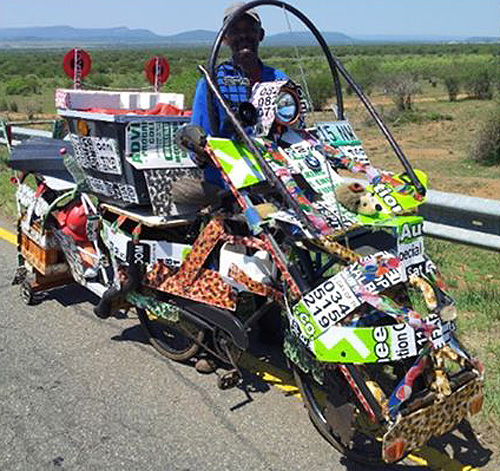
(Thanks to the site, AfriGadget for first publishing these stunning creations!)
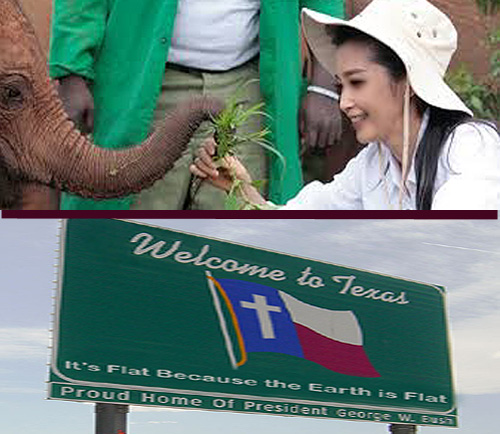 It’s likely there is a greater percentage of Chinese who wish to end the ivory trade and save elephants than there are Texans who believe in evolution.
It’s likely there is a greater percentage of Chinese who wish to end the ivory trade and save elephants than there are Texans who believe in evolution.
Think about that, please.
Yesterday, the Chinese actress Li Bingbing – who has 20 million followers and counting on her social media – made a highly public visit to an elephant orphanage in Nairobi and then called on her fellow Chinese to stop buying ivory.
She joins a growing list of Chinese celebrities aggressively supporting conservation issues, and it makes me so damn mad the way current media again and again is blaming the Chinese for a crisis they’ve also made up: elephant decline.
The same organization for which Bingbing is an honorary ambassador is also one of the few to use realistic numbers regarding elephants. You might have heard of this organization: the United Nations.
The press statement released with Bingbing’s conference referred to “data [that] shows that 17,000 elephants were illegally killed in 2011.”
Contrast that with CNN that described the “slaughter of elephants” at an “alarming rate” and blamed it on the Chinese.
As I’ve pointed out again and again in this blog, animal poaching is horrible. Using the UN’s numbers (see link to the report, below) there are probably a half million or more elephant in Africa, today, and a low estimate of their annual reproductive rate increases that population automatically by 25-35,000 annually.
There are too many elephant. Elephant/human conflict is Africa’s single-largest conservation problem. So even with the illegal poaching, the troublesome population is growing larger and larger every year.
And the notion that it is all due to the Chinese is racist.
Yes, most of the illegal ivory goes to Asia, but Asia is not China. There is huge market in Thailand almost equal to all of China, and another huge market in South Korea. Anyone ever talk about those countries? And a huge portion of the Chinese market comes in through Hong Kong, which is as little Chinese as possible. The next conduits are Indonesia and the Philippines.
But do we ever hear negative things about those capitalist ally mean guys?
This whole made-up story about the imminent doom of elephants is horrible enough in itself. The elephant problem is not with its likely demise, but with the demise of our entire conservation efforts in Africa as young populations of modern Africans get sick and tired of being stepped on by animals preserved for rich foreigners.
Go ahead and let the beast bulldoze your child’s primary school at night and decimate your watermelon crop, so that South African tourism chains can charge $800 per American per night to see them picking their teeth and wagging their tails the next morning.
Look folks, we’ve got to climb down from inaccurate media that’s turning real world conflicts into soap operas. I’m so exasperated not just with CNN, but a whole range of media, each one feeding on the American public’s craven need for apocalypse.
The best factual report about the elephant situation you can read by clicking here. Be patient and refresh your viewer often, because it’s a huge report with many charts and tables and it’s created for CITES by CITES and the UN. Unfortunately it’s skewed towards the apocalyptic angle, for political reasons anticipating the upcoming CITES battle about sales of regulated ivory. But its numbers are solid and absolutely support my ranting and raving.
It’s a real problem, but we aren’t thinking about it correctly or working to resolve it. We’re just using it to titillate us.
Get real. Thank you, Bingbing and UN.
 The Presidents’ Day Holiday in America, today, is perhaps the least celebrated of the year, and it shows how America like much of Africa is moving away from a powerful executive.
The Presidents’ Day Holiday in America, today, is perhaps the least celebrated of the year, and it shows how America like much of Africa is moving away from a powerful executive.
The exceptions validate the rule, so the dozen or so African dictators still in power in places like Uganda, Zimbabwe, Cameroon and Chad, among the most egregious, delineate the old days. As modern African societies emerge and new constitutions are formulated, the chief at the top gets less and less power.
The outstanding example is the “New Kenya.” While the man who will be elected the first president under its new constitution in just a few weeks will be the most powerful man in that country, his powers will be significantly limited compared to the powers of current and former Kenyan presidents.
The “New Kenya” is the wave that is sweeping most of Africa. Modern African societies realize that single personalities – the Grandpa authority – are no longer appropriate as social chief executives.
Ultimately, I believe even America will have to come round to this view. Our president is one of the most powerful social chief executives in the world; probably the most powerful among democratic countries. I think this may have worked well in year’s past when essential U.S. policy was pretty unidirectional.
But today, with radically opposed polarities, the prospect of a strong liberal president being succeeded by a strong conservative, etc., does little to move society in any direction but crazy figure eights.
The new societies – the emerging African societies – are designing and experimenting with better forms of democratic, capitalist government. America will have to follow.
Many government offices are closed, today. Banks are closed. The post office is closed. Some schools are closed and most businesses, like EWT’s, are “technically closed” with the phones not answered. But many workers — perhaps most in America — are at their desks like most any other work day.
Perhaps an affirmation that a strong chief executive shouldn’t be quite so empowered, anymore.
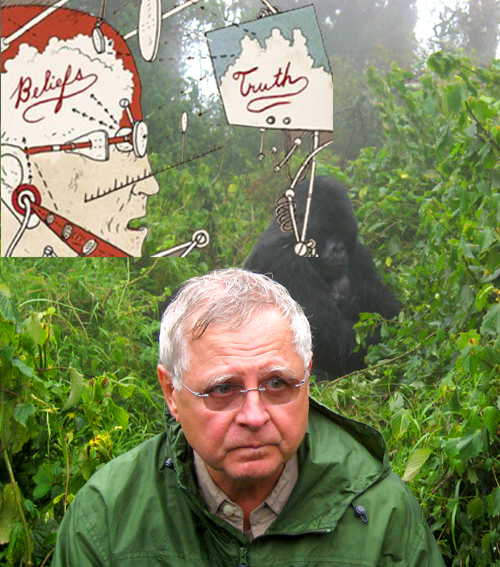
For my news on Somalia I go to sources in Somali and Kenya, and to the diaspora of Somalians mostly in the U.K. For my news on the natural world in Africa I mine the multiple NGOs and excellent science writers world-wide.
For a more global perspective, BBC, Agence France and Reuters are excellent.
But every once in a while I need an American fix. I need the unique perspective that governs my native culture’s perspective on the world, and then I turn to journals like the New York Review of Books, the Atlantic and Science.
And until recently, national public television and radio.
But more and more I find NPR and PBS either pandering to the masses or moving celebrity above facts. It’s particularly true with regards to reporting in Africa, where NPR’s stories have become so superficial that they’ve lost almost all value. And that’s not as bad as when their news is simply dead wrong.
Yesterday evening’s national screening of Sir Richard Attenborough’s memory lane, and this morning’s report by Steve Inskeep from Somalia, are perfect examples.
Both had redeeming components. Attenborough’s compendium of so many years of natural history filming provides us with an incredible chronicle of how global views about conservation have changed. His own mea culpas of his younger days collecting and consuming rare animals was a wonderfully honest admission of that change.
And Inskeep’s wonderfully personal interaction with African troops, allowing them to broadcast their accuity and sensitivities, is strides beyond the staid reporting of foreign bureaus with their latent racism.
But we can’t allow news to carry lies and misinformation, no matter how much other redemption the story may have. In the end, when NPR explains to you that Somalia success is dependent upon western military training, or when Sir Attenborough concludes that mountain gorillas are still threatened, those critically important statements must be substantiated by … the truth, the whole truth, and nothing but the truth.
And they aren’t.
Attenborough’s sloppy use of facts throughout his film was terrible. The worst was when he announced there are now 480 Virunga mountain gorillas left.
There are now 800 Virunga mountain gorillas left. And Attenborough’s factual portrayal of Borneo’s rainforest numbers and the Arctic’s water temperatures and ice cover was also incorrect.
Inskeep’s portrayal of the successful Somalia war as a combined African military force couldn’t be further from the truth. The Somalia war had African peace keeping troops since 2007. And before that the Ethiopians had invaded the country several times.
The African peace keepers for the first four years of their mission were mostly Ugandans, Burundians and a smattering of Nigerians, and they were an abysmal failure.
Did you register that? Abysmal failure.
It was not until the Kenyans decided to unilaterally invade Somalia in October, 2011, that anything began to change. And everything that has changed since has been entirely and only because of the unilateral Kenyan military involvement, and which Kenya announced was publicly not allied to the African peace-keeping force.
And the Kenyans were trained and funded and quite probably directed by the Americans and French.
These are important … facts. The sinister problem is that they might, in fact, not change the overall stories much of either Attenborough’s portrayal of how global views of conservation have changed and positively so, or Inskeep’s contention that routing terrorists in Africa must be by Africans.
But the “overall story” is never the whole story, and the more we try to condense a richly complicated situation into a headline, the less we are actually learning and the more we’re being primed to learn even less the next time around.
“Public” broadcasting is simply becoming too American in America. Acuity and depth is being trumped by what’s considered good entertainment. It’s a shame.
But it’s wrong.
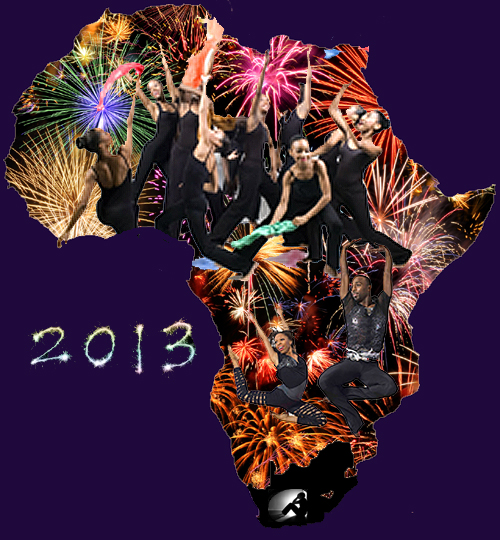 2012 demonstrated more than any other year that African countries are doing better economically and advancing faster socially than their counterparts in The West, their former colonial masters. Except, I’m afraid to say, the giant in the hut, South Africa.
2012 demonstrated more than any other year that African countries are doing better economically and advancing faster socially than their counterparts in The West, their former colonial masters. Except, I’m afraid to say, the giant in the hut, South Africa.
My #3 Top Story of 2012 is the explosive narrative of African progress, and the #4 story is the significant exception, South Africa. To see a list of all The Top Ten, click here.
“Africa isn’t just a place for safaris or humanitarian aid. It’s also a place to make money,” says New York Times columnist Nicholas Kristoff. The well respected author then went on to site dozens of statistics showing Africa out pacing the world economically.
Clearly the average African is neither as comfortable or well off as the average American. But that’s not the point. The average African is mountains higher in comfort and well-being than his parents, and there is every indication that his children will share that euphoric experience.
This is, of course, a generalization but I feel a fair one. Including Somaliland, there are 56 countries in Africa. Perpetual doom and gloom persists in Zimbabwe and the Central African Republic. Increasingly bad news in 2012 plagued Angola, Uganda, Rwanda, Chad and Mali. So my generalization applies to the rest.
This positive view stands in marked contrast to America, where the generation to generation comparison is dismal. The graph projected out another generation or two actually has parts of Africa catching up with American median income.
The World Bank explains this succinctly as a wealth of new natural resource discoveries. Like oil and gold.
But that’s hardly the end of the story. The new-found wealth in the ground is a necessary foundation, just as rich soil was to early Americans and oil was to the 1960s Arab in the Emirates.
But on that foundation is blossoming some exciting non-natural discoveries, in high tech and alternative energy, in natural products manufacture and a score of other industries.
It was poorly reported but extraordinary this year that South Africa bailed out Europe. That’s right. South Africa paid $2 billion into a world monetary fund to help with the Greek and other European bailouts. Economically, the First World took charity from the Third World.
And Africa has no qualms about embracing the best of capitalism, thank you. Walmart was welcomed into South Africa with a warmer embrace than most mid-sized towns in the United States provide the retailer.
But after the hugs and kisses were over, Walmart submitted to a labor agreement that Americans working for Walmart would die for. Why are they able to do this in Africa, and not in America?
And “thing development” is progressing no less fast than social and “thought development.”
Consider the media, (I am). A respected global media watchdog claims that Tanzania has a freer and better media than the U.S. This is because of the worst of American media, which pulls down the overall ranking.
But the worst of American media, Fox News, Rush Limbaugh and sorts, have made mincemeat of the truth, have thrown civility to the wolves and turned making money into a first principal that cares little about the effects of its nearly sadistic approach to the public need.
In defense some of us Americans would point to many exceptional online services like Wired and Mother Jones and The Nation (and dozens more), and as you examine those “good” media you’ll find out the reason is the same as for Tanzania’s position: youth.
America is aging less than gracefully and its right-winger lying mentality is very much linked to old guys. So perhaps Africa has an intrinsic advantage, since such a large portion of its population is young relative to America’s.
Yesterday was historic for the American Congress: 78 women in The House and 20 women in the Senate. This reverses a trend begun about a decade ago where women in elected office began to decline.
But in Kenya that would be mandated at 145 in The House and 33 in the Senate! Mandated?! Yes, Kenya’s new constitution requires that a third of all elected officials be women, almost doubling in one fell swoop what it’s taken America more than 200 years to accomplish.
The new Kenyan constitution, modeled but improved on South Africa’s new constitution, is quickly becoming a model worldwide. Simple and common sense things like religion banned from schools and institutionalized affirmative action that adjusts to ethnicity and gender as society continually changes puts Kenya on a markedly higher moral plane than America.
I think above all other things socially, though, is the new African attitude towards justice. America is petrified with the concept of sharia Law, for instance if applied in the new Egypt. But Americans understand little of this and can’t even see how any set of laws can be molded to virtually any social model.
Our own Supreme Court has bent and twisted, upheld and struck down, and essentially remolded and unmolded society again and again. American laws on such things as drug possession (marijuana), abortion, gambling and even incest and slavery have gone all over the chart!
There was no direction from the “Founding Fathers” on those issues part and parcel to modern day life. And the irony is that so many Americans think otherwise, that there is some Founding Father out there guiding our every move.
The new Kenya justice will be an amalgam of Islamic sharia and British common law. Some feat, eh? But beautiful and adjusted to the realities of its new society.
But Kenya recognizes – like so much of the world, America excepted – that there is a global morality, today. That there is a worldwide foundation for such things as basic human rights.
Four of Kenya’s most prominent citizens have submitted to charges filed against them at the World Court in The Hague. Voluntarily they will go to The Netherlands for their trial. Now it needs to be said, of course, that these criminals (as I think they are rightly charged) would likely not do so if the Kenyan public hadn’t forced them to. And that is the majesty and beauty of the situation.
An important aside: recently convicted in the World Court, former Liberian leader Charles Taylor in pleading for leniency in his sentencing for war crimes pointed out that he was convicted of crimes no different from those of George Bush in Iraq.
The justices gave no reply.
This was not the case for our own great Justice Ginsberg who dared to speak the truth in Cairo, when she told the Egyptians that maybe the U.S. constitution wasn’t right for them.
The onslaught of criticism that followed, the incredible vitriol from the right, wasn’t just humiliating to us Americans, it was … well, barbaric. It was truly like German Goths grumbling over Roman progressives. Ginsberg is of course right, and fortunately she rather than Senator Kruz is what Egyptians will and are considering for their own new, progressive societies.
But alas, it’s not all good news for Africa. Africa’s behemoth is South Africa. Its economy is multiples of the rest of the entire continent combined. Its history is as complex and fascinating as our own. And hardly 20 years ago it reformed itself into one of the most progressive, moral societies on earth.
But now, things don’t look so good.
Residual racism and neo-apartheidism are sprouting across its non-black societies. I don’t think this is because it was always destined to be so, that there was some kind of intransigent ethic among whites that would eventually surface again, like an old whale on its last sound.
Rather, it’s because the current president has made it so. Jacob Zuma is a joke.
He’s vain, and easily set off by criticism. He’s so wrapped up in himself, he’s let the country wander leaderless. He’s patently ignored the courts, acted like a banana republic dictator and all the while the country spiraled downwards.
Many local experts, white and black and left and right, are beginning to see him not so much a central actor separate from the times, but rather the embodiment of something greater:
The implosion of the ANC, the freedom fighter party that won the battle against apartheid and whose marshal was Nelson Mandela.
I think this is true, and that’s why this is my fourth most important story of 2012. Yet it’s with hope that I also see Zuma coming to an end sooner than the constitution would mandate, and of the ANC moving restlessly to get its act together. It may, however, be too late.
So the year ends on an incredibly positive note for the continent as a whole, but a seriously cautionary one for its grand marshal.